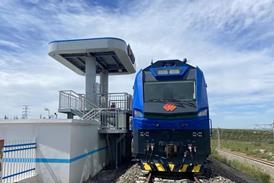GEORGIA: Despite, or perhaps because of, parliamentary elections in May, the government has embarked on another attempt to privatise Georgian Railways. Bids were invited by January 25, although no structure or timetable had been set for the process.
Last year the Caucasian republic tried handing a 99-year concession to UK-based Parkfield Investment, reputedly backed by a local oligarch and advised by former railwaymen from western Europe. Parkfield had apparently offered to invest US$1bn in modernising the 1 612 km network, but the deal collapsed in October over a requirement to re-route sections of line in Tbilisi and along the Black Sea coast.
The latest attempt attracted interest from five companies: Center Invest Capital Partner of Russia, Sweden's Capital Investment Group, Stratton Holding LLS and East Capital from the USA, and the Kazakhstan-based Silk Road Group. Bidders were invited to outline their preferred model for privatisation and a tentative investment schedule.
Two possible approaches have already been proposed. On January 17 Prime Minister Lado Gurgenidze suggested a 'flexible privatisation', starting with the sale of a 10% stake, followed by a further 25% and so on. He would put any receipts into a new state fund being established to deal with national disasters. By contrast, former Minister for Reform Kakha Bedukize prefers converting GR into a joint-stock company and floating it, allowing the state to retain a golden share.
President Mikheil Saakashvili has pursued an aggressive privatisation programme over the past few years. Nevertheless, Deputy Minister of Economic Development Vato Lezhava insists that the government has 'no obligation' to accept any of the bids, as 'no concrete decision has been made yet ... we may sell the railway, or we may not'.
A former member of the GR supervisory board, Gia Khukhashvili believes the railway is one of Georgia's strategic assets as a core part of the Silk Road transport corridor. He favours delaying any privatisation for two years, pending further investment to improve the condition of the assets, which would increase the potential return.
An unspoken objective behind the aborted Parkfield venture, we understand, was to prevent GR coming under Russian control. As they assess the latest bids, ministry officials will be aware of the situation in neighbouring Armenia, where RZD was the sole bidder for a 30-year concession to run that country's rail network (RG 1.08 p52).
















